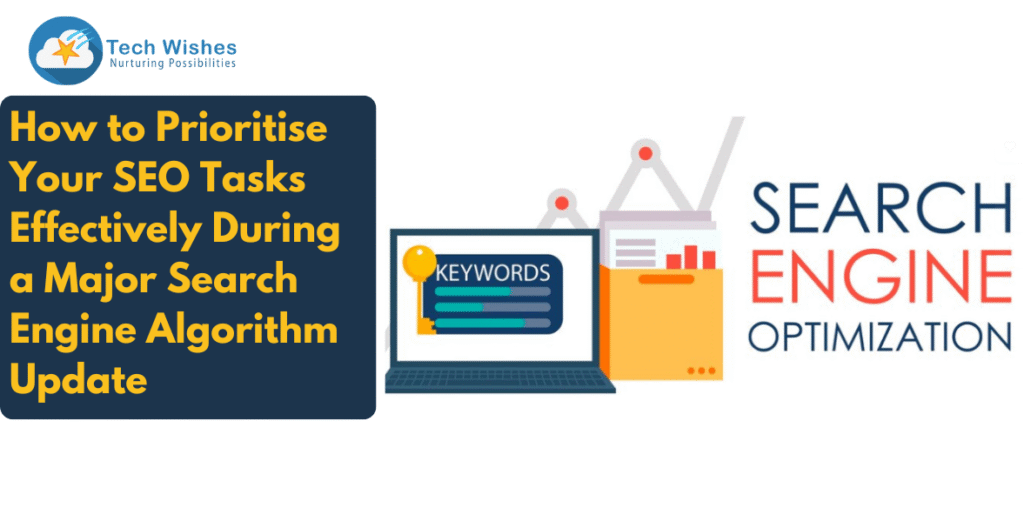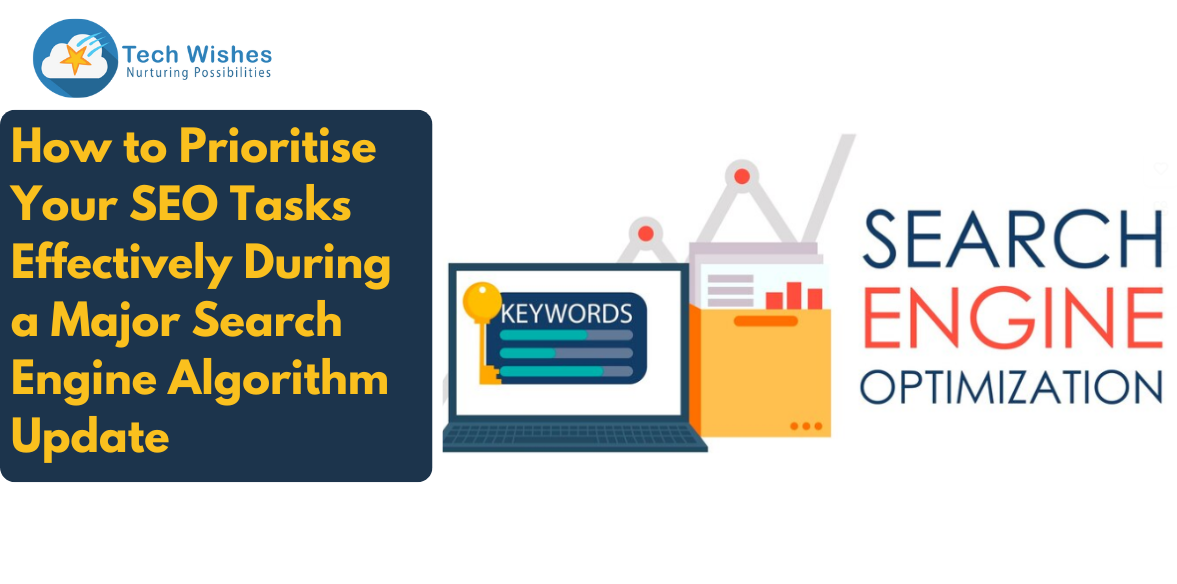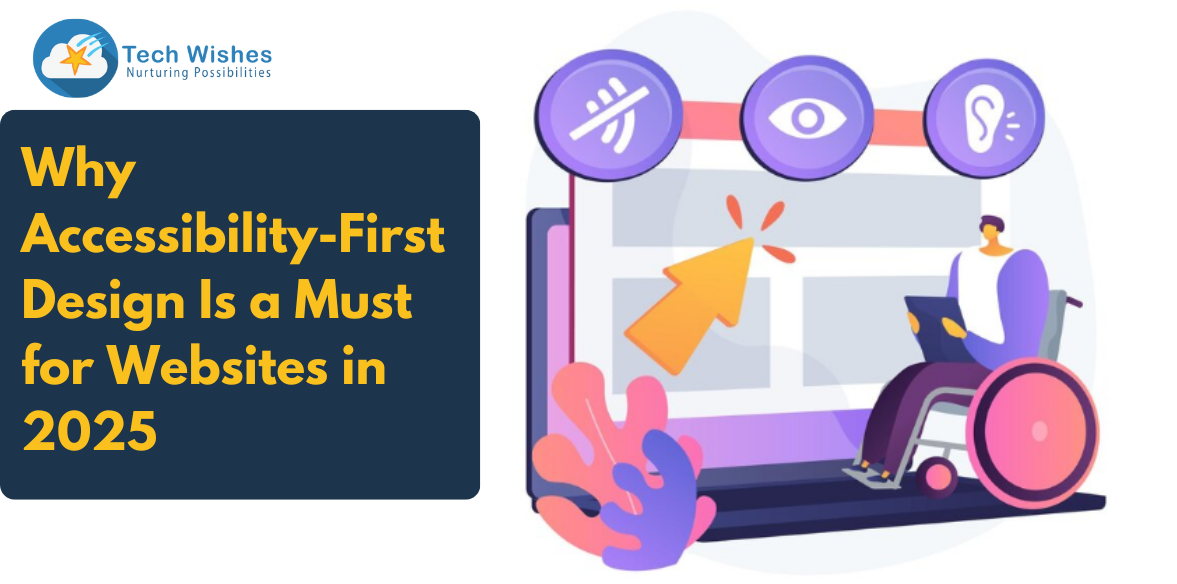Search engine algorithm updates can be unsettling, particularly if they cause fluctuations in rankings and organic traffic. Nevertheless, having a systematic process to prioritize your SEO tasks will enable you to adjust well and keep your site visible. Tech Wishes is a top-rated SEO agency with expertise in riding through algorithm shifts and achieving sustainable search success. This guide will assist you in prioritizing your SEO tasks whenever Google or any other search engine releases a major update.
Understanding Algorithm Updates and How They Affect You
Search engines such as Google regularly update their algorithms to improve search quality and user experience. These updates can:
Alter ranking factors, affecting website rankings overnight.
Impose penalties on negative SEO tactics.
Reward sites with better content and user experience.
To remain ahead, SEO professionals must be proactive, flexible, and focused on the right activities at the right moment.
Step-by-Step Guide to Preparing SEO Tasks During an Update
- Keep Yourself Updated on the Update
The initial step towards dealing with any algorithm update is comprehending its motive and effects. Keep an eye on these sources for live updates:
Google Search Central Blog – Official messages from Google.
SEO news websites – Search Engine Journal, Search Engine Land, and Moz.
Industry forums & discussions – Twitter, Reddit, and SEO communities.
A top-notch SEO service provider keeps a close eye on these sources to get quick analyses of updates and make changes accordingly.
- Evaluate Your Site’s Performance
Utilize tools such as Google Search Console, Google Analytics, and third-party SEO tools to measure how the update impacts your site. Important performance metrics (KPIs) to track include:
Organic traffic – Look for any major dips or surges.
Keyword rankings – Determine pages that dropped or gained ranks.
CTR (Click-Through Rate) – Check if search snippets require optimization.
Bounce rate & dwell time – Know user interaction.
If you see your rankings declining, do not panic. Algorithm updates require settling time, and instant changes might not be required.
- Optimize Content Quality & Relevance
Content is always the key to SEO success. After the update, review your website content strategy by:
Determining low-performing content – Pages that lost ranking might need updates.
Enhancing content depth – Insert new insights, statistics, and relevant keywords.
Improving readability & structure – Use clear titles, bullets, and shorter paragraphs.
Preventing duplicate content – Be unique to avoid a penalty.
Google prefers quality, authoritative content, so spend on thorough and interesting content.
- Optimize for E-E-A-T (Experience, Expertise, Authoritativeness, and Trustworthiness)
Credibility of content is the focus in recent updates. Increase your website’s trust signals by:
Developing authoritative backlinks from high-quality sites.
Displaying author expertise – Include author bios with credentials.
Ensuring security features are implemented – Making sure HTTPS is enabled.
Visible contact information & privacy policies – Increases validity for Google.
The best SEO company will prioritize E-E-A-T when it comes to future-proofing websites from fluctuating rankings.
- Validate and Optimize Technical SEO
Technical SEO takes considerable importance in the matter of search engines crawling and ranking your site. After an update, make sure:
Optimize site speed – Utilize instruments such as Google PageSpeed Insights to rectify slow pages.
Mobile-friendliness – A responsive design provides a seamless experience across all devices.
Crawl error fixing – Look for indexing problems in Google Search Console.
Structured data markup – Use schema markup to increase search visibility.
These enhancements make your site comply with Google’s best practices and prevent negative ranking effects.
- Fortify Link Building and Off-Page SEO
If rankings decline after the update, review your backlink profile:
Remove toxic backlinks – Utilize Ahrefs or SEMrush to disavow spam links.
Prioritize high-quality backlinks – Guest blogging, digital PR, and outreach can work.
Enhance internal linking – Reinforces website structure and facilitates distribution of link equity.
A top SEO expert will make sure that your site’s off-page strategy is solid and in line with Google’s changing algorithms.
- Optimize for User Experience (UX) and Core Web Vitals
Google prioritizes websites that offer a seamless user experience. Post-update, evaluate:
Page loading speed – Aim for under 2 seconds.
Mobile usability – Ensure a responsive and touch-friendly interface.
Engagement metrics – Lower bounce rates by improving navigation and interactivity.
A well-optimized UX signals to Google that your website provides value, improving rankings in the long run.
- Monitor Competitor Performance
Understanding how competitors are affected by an update provides valuable insights. Analyze:
Which of the competitors acquired rankings?
What content strategies are they employing?
Any new keywords they are targeting?
Learning from their strategy, you can tailor your SEO strategy accordingly.
- Update Your Keyword Strategy
If rankings change after the update, re-evaluate your keyword emphasis:
Find trending search terms – Use Google Trends and keyword analysis tools.
Target intent-based keywords – Change focus to transactional, informational, or navigational keywords.
Optimize for long-tail keywords – They tend to have lower competition and better conversion rates.
A well-thought-out keyword approach guarantees long-term ranking stability regardless of algorithm updates.
- Be Patient & Keep Testing
SEO is a marathon, not a sprint. Algorithm updates tend to take weeks to roll out completely, and rankings tend to wobble before settling. Don’t make drastic changes too early. Instead:
Test small optimizations and monitor their effects.
Keep monitoring updates regularly to fine-tune strategies accordingly.
Emphasize long-term sustainable SEO strategies over temporary fixes.
Conclusion
Algorithm changes are unavoidable, but with planning, they don’t have to be destructive. By remaining up to date, focusing on content value, improving technical SEO, and optimizing user experience, companies can not only bounce back from ranking losses but also come out stronger than their competitors.
Here at Tech Wishes, our experts in SEO guide companies through the transitions seamlessly. Being the best SEO agency, we ensure your website stays optimized, robust, and at the lead.
Need master SEO services? Reach out to Tech Wishes today to secure your rankings and optimize your website for success!




